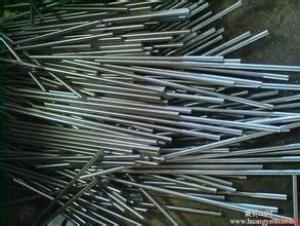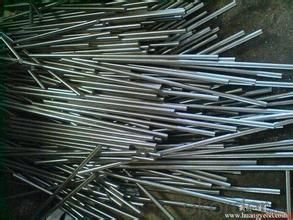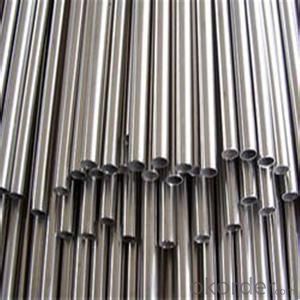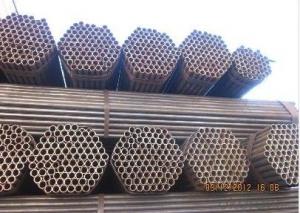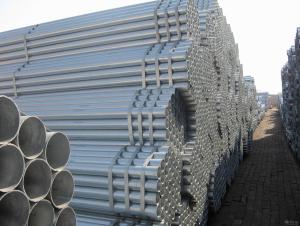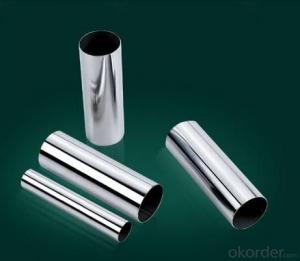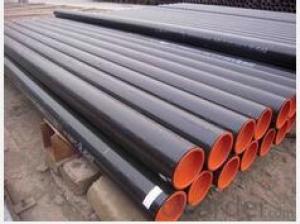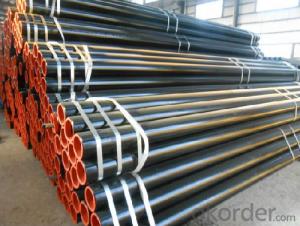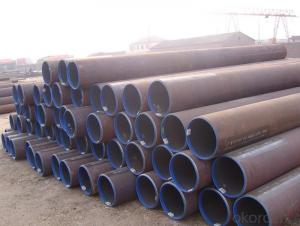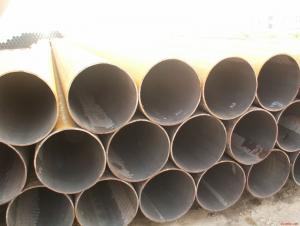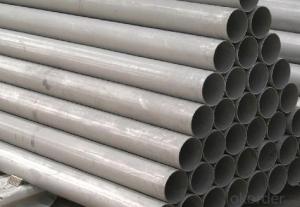Seamless Steel Pipe for Petroleum Cracking for Frozen Food
- Loading Port:
- China main port
- Payment Terms:
- TT or LC
- Min Order Qty:
- 5 m.t.
- Supply Capability:
- 4500 m.t./month
OKorder Service Pledge
OKorder Financial Service
You Might Also Like
Product Description:
Seamless steel pipe with hollow section, used as a large number of pipe conveying fluid, such as oil, natural gas, coal gas, water and some solid materials such as pipelines. Compared with steel and round steel solid steel, the torsional strength of bending is same, the weight is light, is a kind of economic section steel, widely used in the manufacture of structural parts and mechanical parts, such as the oil pipe, automobile transmission shaft, the bicycle frame and steel construction with scaffold with steel pipe manufacturing annular parts, can improve the the material utilization rate, simplify the manufacturing process, material saving and working hours, has been widely used in steel pipe manufacturing
Standard:
GB9948 Chinese national standard
Application:
Served as for furnace tubes,heat exchange tubes and pipelines in petroleum and refinery plants
Model No.of major steel tubes:
1n 9n 1Er!rMn 1rhMn 1f:hM0 etC
Diamensional tolerances:
Types of steel tubes | Outer diameter | Wall thickness | ||
Cold-rolled tubes | Tube sizes(mm) | Tolerances(mm) | Tube sizes (mm) | Tolerances(mm) |
>30~50 | ±0.3 | ≤30 | ±10% | |
>50~219 | ±0.8% | |||
Hot-rolled tubes | >219 | ±1.0% | >20 | ±10% |
Mechanical properties:
Standard codes | Models of steel tubes | 抗拉强度(MPa) | 屈服强度(MPa) | 伸长率(%) | 冲击功(J) | 布氏硬度(HB) | 交货状态 |
GB9948 | 10 | 330~490 | ≥205 | ≥24 | / | / | 正火 |
20 | 410~550 | ≥245 | ≥21 | ≥39 | / | 正火 | |
15CrMo | 440~640 | ≥235 | ≥21 | ≥47 | ≤170 | 正火加回火 | |
1Cr2Mo | ≥390 | ≥175 | ≥22 | ≥92 | ≤179 | 正火加回火 | |
1Cr5Mo | ≥390 | ≥195 | ≥22 | ≥92 | ≤187 | 退火 |
Chemical composition:
Standard codes | Models of steel tubes | Chemical compositions(%) | |||||||
C | Si | Mn | P | S | Cr | Mo | Ni | ||
GB9948 | 10 | 0.07~0.14 | 0.17~0.37 | 0.35~0.65 | ≤0.035 | ≤0.035 | ≤0.15 | / | ≤0.25 |
20 | 0.17~0.24 | 0.17~0.37 | 0.35~0.65 | ≤0.035 | ≤0.035 | ≤0.25 | / | ≤0.25 | |
15CrMo | 0.12~0.18 | 0.17~0.37 | 0.40~0.70 | ≤0.035 | ≤0.035 | 0.80~1.10 | 0.40~0.55 | ≤0.30 | |
1Cr2Mo | ≤0.15 | 0.50~1.00 | 0.30~0.60 | ≤0.035 | ≤0.030 | 2.15~2.85 | 0.45~0.65 | / | |
1Cr5Mo | ≤0.15 | ≤0.50 | ≤0.60 | ≤0.035 | ≤0.030 | 4.00~6.00 | 0.45~0.60 | ≤0.60 | |
FAQ of Seamless Pipe :
①How is the quality of your products?
Our products are manufactured strictly according to national and internaional standard, and we take a test on every pipe before delivered out. If you want see our quality certifications and all kinds of testing report, please just ask us for it.
Guaranteed: If products’ quality don’t accord to discription as we give or the promise before you place order, we promise 100% refund.
②How about price?
Yes, we are factory and be able to give you lowest price below market one, and we have a policy that “ for saving time and absolutely honest business attitude, we quote as lowest as possible for any customer, and discount can be given according to quantity”,if you like bargain and factory price is not low enough as you think, just don’t waste your time.Please trust the quotation we would give you, it is professional one.
③Why should you chose us?
Chose happens because of quality, then price, We can give you both.Additionally, we can also offer professional products inquiry, products knowledge train(for agents), smooth goods delivery, exellent customer solution proposals.Our service formula: good quality+good price+good service=customer’s trust
SGS test is available, customer inspection before shipping is welcome, third party inspection is no problem.
Any question, pls feel free to contact us !
Seamless Pipe Images:
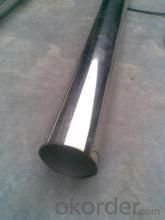
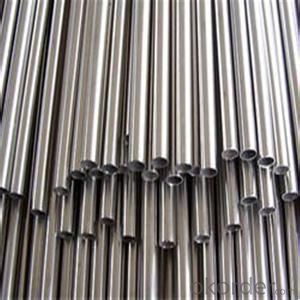
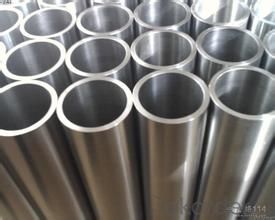
- Q: Can steel pipes be used in earthquake-prone areas?
- Yes, steel pipes can be used in earthquake-prone areas. Steel has high tensile strength and can withstand seismic forces better than other materials. Additionally, steel pipes can be designed to be flexible and resistant to bending and cracking during earthquakes, making them a suitable choice for infrastructure in such areas.
- Q: How to descaling galvanized steel pipe?
- Galvanized steel tubes will not rust in principle.... Batch rust with weak acid water immersion, individual can use steel wire brush brush on it.
- Q: Can steel pipes be used for water supply systems?
- Yes, steel pipes can be used for water supply systems. They are commonly used in many industrial and commercial applications due to their durability and strength. However, it is important to note that steel pipes need to be properly coated or lined to prevent corrosion and ensure water quality. Additionally, steel pipes may require more maintenance compared to other materials like PVC or copper.
- Q: How are steel pipes measured and specified?
- Several key parameters are used to measure and specify steel pipes. These parameters include the outer diameter (OD), wall thickness, and length of the pipe. The outer diameter is the measurement of the pipe's outside surface from one end to the other. It is typically expressed in millimeters or inches and plays a critical role in determining the pipe's strength and carrying capacity. Different applications require different OD sizes, which can range from a few millimeters to several feet. The wall thickness refers to the distance between the pipe's outer and inner surfaces. It is measured in millimeters or inches and is crucial for determining the pipe's durability and resistance to pressure. Thicker walls can handle higher pressure, making them suitable for applications that require transporting liquids or gases under high pressure. Steel pipes are generally specified in meters or feet for their length. Standard pipe lengths are often 6 or 12 meters (20 or 40 feet), but custom lengths can be requested based on project requirements. It is important to note that longer pipes may require additional support to prevent sagging or structural issues. In addition to these primary measurements, steel pipes may also be specified based on other factors such as material grade, manufacturing standard, and surface finish. Material grade refers to the quality and composition of the steel used in the pipe, determining its strength and corrosion resistance. Manufacturing standards, such as ASTM or API, ensure that the pipes meet specific quality and performance criteria. Surface finish specifications may include factors like galvanized coating, providing protection against corrosion or other specific requirements based on the intended application. Overall, the measurement and specification of steel pipes involve considering the outer diameter, wall thickness, length, material grade, manufacturing standard, and surface finish. These parameters are crucial in determining the suitability of the pipe for various applications and ensuring its performance and durability in different environments.
- Q: What are the common methods for repairing steel pipes?
- Some common methods for repairing steel pipes include welding, pipe wrapping, pipe relining, and pipe bursting.
- Q: Are steel pipes suitable for structural applications?
- Yes, steel pipes are suitable for structural applications. Steel pipes are known for their strength, durability, and versatility, making them ideal for various structural applications. They can be used in buildings, bridges, stadiums, and other structures to provide support and stability. Steel pipes have high tensile strength, which allows them to withstand heavy loads and resist deformation under pressure. Additionally, their resistance to corrosion makes them a reliable choice for structural applications, even in harsh environments. The use of steel pipes in structural applications is further enhanced by their cost-effectiveness and easy installation. Overall, steel pipes are a popular choice in the construction industry due to their strength, durability, versatility, and cost-effectiveness.
- Q: What does "DN25 PN16" mean?
- Steel pipe DN25, PN16, first of all, for this annotation: pipe DN class, often used in welded pipe, such as welded pipe DN25. PN16 means pressure, that is, 16 kilograms (1.6MPa).
- Q: Are steel pipes suitable for pharmaceutical manufacturing facilities?
- Yes, steel pipes are suitable for pharmaceutical manufacturing facilities. Steel pipes are commonly used in pharmaceutical manufacturing due to their excellent corrosion resistance and durability. They can withstand high pressure and temperature conditions, making them ideal for various applications such as transporting fluids, gases, and chemicals within the facility. Additionally, steel pipes can be easily cleaned and sanitized, ensuring the integrity and safety of pharmaceutical products. Furthermore, steel pipes are cost-effective and have a long service life, making them a reliable choice for pharmaceutical manufacturing facilities.
- Q: How do you calculate the pipe flow rate for steel pipes?
- To calculate the pipe flow rate for steel pipes, you will need to consider various factors. Firstly, determine the inside diameter of the pipe, typically denoted as D. Next, measure the length of the pipe, denoted as L. Additionally, you will need to know the pressure drop, ΔP, across the pipe and the fluid density, ρ. Once you have this information, you can use the Darcy-Weisbach equation or the Hazen-Williams equation to calculate the flow rate. The Darcy-Weisbach equation is commonly used for pipes with turbulent flow, while the Hazen-Williams equation is often used for pipes with laminar flow. For the Darcy-Weisbach equation, the formula is: Q = (π/4) * D^2 * √(2ΔP/ρ) Where Q is the flow rate in cubic meters per second, D is the inside diameter of the pipe in meters, ΔP is the pressure drop across the pipe in pascals, and ρ is the fluid density in kilograms per cubic meter. For the Hazen-Williams equation, the formula is: Q = C * (D^2.63) * (ΔP^0.54) * (L^0.63) Where Q is the flow rate in cubic meters per second, D is the inside diameter of the pipe in meters, ΔP is the pressure drop across the pipe in pascals, L is the length of the pipe in meters, and C is the Hazen-Williams coefficient which depends on the roughness of the pipe. To accurately calculate the pipe flow rate, it is important to ensure that the units of measurement are consistent throughout the calculation. Additionally, it is crucial to have accurate measurements of the inside diameter, length, pressure drop, and fluid density to obtain reliable results.
- Q: What are the different methods of heat treatment for steel pipes?
- Some of the different methods of heat treatment for steel pipes include annealing, quenching, tempering, normalizing, and stress relieving.
Send your message to us
Seamless Steel Pipe for Petroleum Cracking for Frozen Food
- Loading Port:
- China main port
- Payment Terms:
- TT or LC
- Min Order Qty:
- 5 m.t.
- Supply Capability:
- 4500 m.t./month
OKorder Service Pledge
OKorder Financial Service
Similar products
Hot products
Hot Searches
Related keywords
